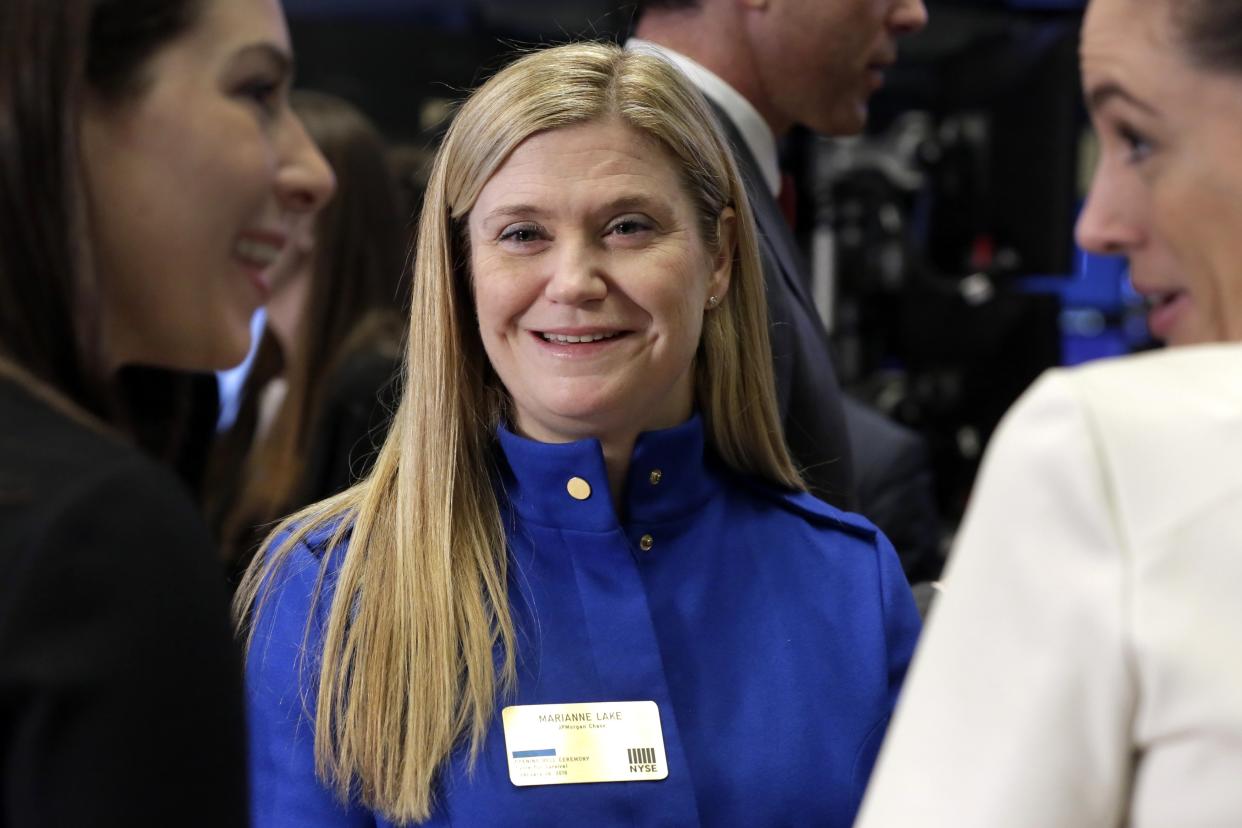JPMorgan's exec shuffle might lead to the bank's first female CEO
JPMorgan Chase (JPM) has announced executive role changes for its two top women at the firm, resulting in speculation that the largest U.S. bank might be the first to see a female CEO at the helm.
On Wednesday, CEO Jamie Dimon announced that 49-year-old CFO Marianne Lake, will move from her current role to CEO of consumer lending and report to co-president Gordon Smith.
Meanwhile, Jenn Piepszak, who is also 49 and the current CEO of card services, will take over as CFO—reporting to Dimon. Piepszak will also join the firm's 12 person operating committee, where Lake will continue to hold a seat.
In a statement, Wall Street’s longest serving CEO heaped praise on both women and applauded their contributions to the firm. The moves take effect May 1.
Speculation has surrounded Dimon’s succession plan for years. Although Dimon has battled cancer in the past, he’s stated publicly he has no immediate plans to step down.
Yet Lake—one of the most visible women on Wall Street—has long been considered a front-runner for the top job.

‘Best in class’
Following the announcement, some wondered if both women were in contention for JPMorgan’s next chief.
The shuffle “seems hugely significant for succession since it provides Marianne Lake operating experience, and seems to make her the frontrunner if she succeeds in her new role over the 4 or so years," Wells Fargo senior bank analyst Mike Mayo wrote in a new note.
"Having said that, the new CFO (who presented at investors days in 2017 and 2019) is a less well-known commodity,” he added, even though Piepszak has headed up JPMorgan’s cards services and business banking units, among other things.
Mayo also characterized the move as "indicative of best-in-class job rotation," since the firm willingly gives its executives different opportunities.
"We are always amazed when we see executives at its annual Investor Days who are in new positions," Mayo wrote.
He also argued that it's good for retention, noting Lake has been in her role for more than six years, and "would surely be sought elsewhere if not given new challenges."
Bank CEOs take heat on diversity
The announcement from Dimon also comes a week after the House Financial Services Committee grilled him and other big bank CEOs. During the lengthy hearing, Rep Al Green (D-TX) pointed out that all seven CEOs were white men.
“This is not a pejorative — you've all sermonized, to a certain extent, about diversity. If you believe that your likely successor will be a woman or a person of color would you kindly extend a hand in the air?" Green questioned the panel.
Green went on to suggest that it was time for a woman or a person of color to rise in the ranks.
“I know it's difficult to go on the record sometimes, but the record has to be made. All white men and none of you, not one of you appears to believe your success will be a female or person of color. Is your bank likely to have a female or person of color within the next decade?” Green asked.
Five of the seven CEOs, including (C) Michael Corbat, Bank of America's (BAC) Brian Moynihan, and Goldman Sachs’s (GS) David Solomon, raised their hands, but Dimon and Morgan Stanley's (MS) James Gorman did not.
Last Friday, during an earnings call with journalists, Dimon was pressed by a reporter about why he didn't raise his hand during Green’s questioning.
"First of all, we don't talk about succession publicly," Dimon said, also taking issue with the timeframe presented in the question. He noted that it's "possible" and likely to happen over a more extended period.
"[This] has nothing to do with Marianne. People just take these things so far out of proportion," he added, before praising Lake—who was also on the same call—as being "exceptional."
Having taken the helm in 2005, Dimon is the last big bank CEO from the financial crisis.
In January 2018, Dimon, 63, said he planned to stay on as CEO for approximately five more years, though some expect he may remain in the role longer.
"[The] point about succession seems moot, since we don't see Jamie Dimon leaving as CEO anytime soon. Indeed, there are precedents set by other banking CEOs to remain longer than historical," Mayo wrote."
According to Mayo, JPMorgan is in about "the strongest position in its current history," and he expects the stock to hit an all-time high.
Julia La Roche is a finance reporter at Yahoo Finance. Follow her on Twitter.
